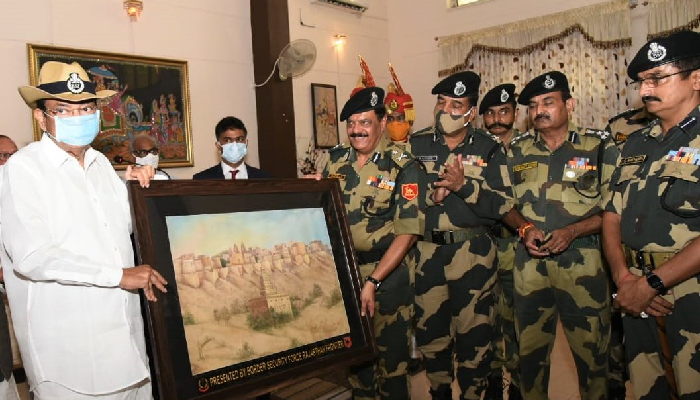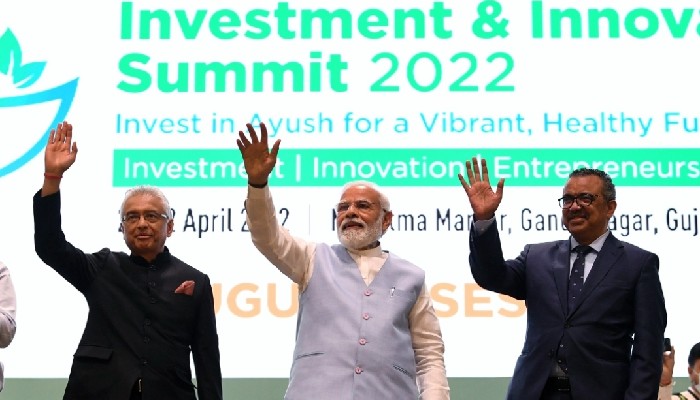Use of drones for smuggling arms and drugs has become the latest challenge for the country and its security, said the Vice President
Vice President M Venkaiah Naidu on Wednesday said the emerging geopolitical situation in the country’s neighbourhood is likely to pose “new challenges” to the border guarding forces and expressed confidence that BSF will continue to thwart the nefarious designs of enemies of peace.
The Vice President said this while addressing BSF officers during his visit to the Force’s Jodhpur Frontier Headquarters
“The way BSF has been securing the borders of the nation for the last 56 years is highly commendable,” the Vice President said.
Appreciating the comprehensive briefing given by Pankaj Goomer, IG, BSF along with his team of officers to him, Naidu said the BSF had many great achievements since it was raised on 1st December 1965.
He said, the Force fought valiantly the 1971 war with Pakistan in both Eastern and Western theatres and brought many decorations and laurels to the nation.
Referring to the inhospitable terrains in which the Force remains deployed ranging from sub-zero temperatures of Jammu and Kashmir to Thar deserts of Rajasthan where the temperature rises up to 55 degrees, Naidu observed that the Force has proved its capacity to curb insurgencies effectively in different parts of the country.
“I am aware that at present, the Force is fighting Naxals in Chhattisgarh and Odisha”, he added.
Stating that the BSF has made many supreme sacrifices in the line of duty to preserve the unity and integrity of the country, he said the force’s vigilance at the borders and counter-action against the enemies and hostile elements reinforces the confidence among the border population and provides a sense of security to them.
The Vice President commended the BSF personnel for extending help to people in distress during natural disasters like earthquakes and floods. He expressed his happiness that BSF personnel have been sensitizing people in border areas on the COVID-19 pandemic and providing necessary support to them under the Civic Action Program.
Later in the day, the Vice President visited ICAR-Central Arid Zone Research Institute (CAZRI) at Jodhpur and interacted with the scientists and staff.
Addressing the scientists at the institute, the Vice President emphasized the need to provide greater outreach to the farmers.
“Technologies should not remain confined to laboratories and scientific know-how should be transferred to farmers,” he said.
In this regard, he also called for combining new technologies with our traditional knowledge for making agriculture sustainable and profitable.
He urged the scientists to come out with innovative methods and solutions to mitigate the problems faced by farmers—from the impact of climate change to increasing the yields.
The Vice President suggested that the thrust areas for arid zone agriculture must include increasing substantially the area under fruits and vegetables, diversification of farming to reduce the risk of losses due to failure of a single crop, increasing the use of drip and sprinkler irrigation, ensuring timely credit with low interest and availability of quality seed, agri-inputs like fertilizers and pesticides.
Opening that populist measures such as loan waivers are not a long-term solution to farmers’ problems, Naidu called for providing easy and timely credit, assured power supply and better marketing facilities to make agriculture viable and profitable.
During the visit the Vice President was taken to various facilities at the institute and briefed upon the work being undertaken by CAZRI in the areas of arid agriculture, water conservation, cattle breed enhancement and food processing. Praising the good work being done by the scientists of ICAR-CAZRI, Naidu asked them to visit more and more villages to understand farmers’ problems and find solutions for the same.
 Contact Us
Contact Us  Subscribe Us
Subscribe Us









 Contact Us
Contact Us
 Subscribe
Subscribe
 News Letter
News Letter

